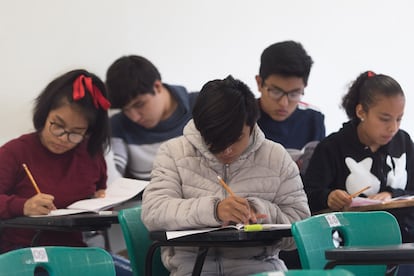Today’s pressing issue of education on sustainable development
Young people are increasingly calling for urgent and decisive change, and for world leaders to assume their responsibilities and be held accountable for the actions they are taking

In recent years, the countries of Latin America and the Caribbean have experienced an increasing number of climate change impacts: extreme heat and cold episodes; uncontrollable forest fires; receding coastlines in the small island states of the Caribbean; or droughts and floods with serious consequences for local populations. According to the latest report of the Intergovernmental Panel on Climate Change (IPCC), the evidence indicates that the origin of these changes is unquestionably anthropogenic, in other words, originated by the direct action of mankind and its decisions that continue to this day. The disconnection of those who are making the decisions is not only impacting our planet’s climate, but also increasing and creating new gaps that make it progressively more difficult to achieve the sustainable development goals agreed in the Agenda 2030.
Education can and should equip us better to confront these challenges. Education for Sustainable Development (ESD) is a guiding framework to ensure that educational models — through their policies, actions, and approaches — contribute to the 2030 agenda by preparing new generations to tackle and find solutions to the challenges that plague the world in terms of sustainability. ESD must constitute a major commitment that unites the efforts of governments and society as a whole to transform the relationship between people and their environment and lead to more sustainable lifestyles.
Progress along this path requires the necessary changes to ensure that education develops in students the skills, knowledge, and values needed to confront, mitigate and transform the situations endangering our world. This will enable the current and future generations to pursue their life projects in harmony with the planet. This will lay the foundations for more inclusive, just and democratic societies.
One of the major challenges facing the planet is the importance of education as a response to climate change, which was recognized at the Paris Climate Change Conference (COP-21) in 2015. When delegates from 195 countries drew up the Paris Agreement, Article 12, on education, was the first to be approved. In the following COPs, the importance of ESD for the attainment of the various global issues was reiterated, with the understanding that sustainable development promotes a profound change in attitudes and behaviors that extend far beyond environmental education.
Tackling the issue of sustainability is a matter of survival. Such is the conclusion of the Regional Meeting for Latin America and the Caribbean of the Education for Sustainable Development Network, held August 29-31 by OREALC/UNESCO Santiago, which assembled representatives from more than 20 countries in the region, civil society and youth to share and exchange experiences and lessons learned with a view to advancing steadily towards the transformation of education systems.
If the current trends continue, today’s youth and the generations that follow will be inheriting a world in which life is increasingly impossible. What is at stake is their present and their future. In response, it is the youth who are increasingly speaking out, demanding urgent and decisive change, and calling on world leaders to shoulder their responsibilities and be held accountable for their actions. This change is and must be the responsibility of all of us. The time to act is today, because tomorrow may be too late.
Sign up for our weekly newsletter to get more English-language news coverage from EL PAÍS USA Edition
Tu suscripción se está usando en otro dispositivo
¿Quieres añadir otro usuario a tu suscripción?
Si continúas leyendo en este dispositivo, no se podrá leer en el otro.
FlechaTu suscripción se está usando en otro dispositivo y solo puedes acceder a EL PAÍS desde un dispositivo a la vez.
Si quieres compartir tu cuenta, cambia tu suscripción a la modalidad Premium, así podrás añadir otro usuario. Cada uno accederá con su propia cuenta de email, lo que os permitirá personalizar vuestra experiencia en EL PAÍS.
¿Tienes una suscripción de empresa? Accede aquí para contratar más cuentas.
En el caso de no saber quién está usando tu cuenta, te recomendamos cambiar tu contraseña aquí.
Si decides continuar compartiendo tu cuenta, este mensaje se mostrará en tu dispositivo y en el de la otra persona que está usando tu cuenta de forma indefinida, afectando a tu experiencia de lectura. Puedes consultar aquí los términos y condiciones de la suscripción digital.








































